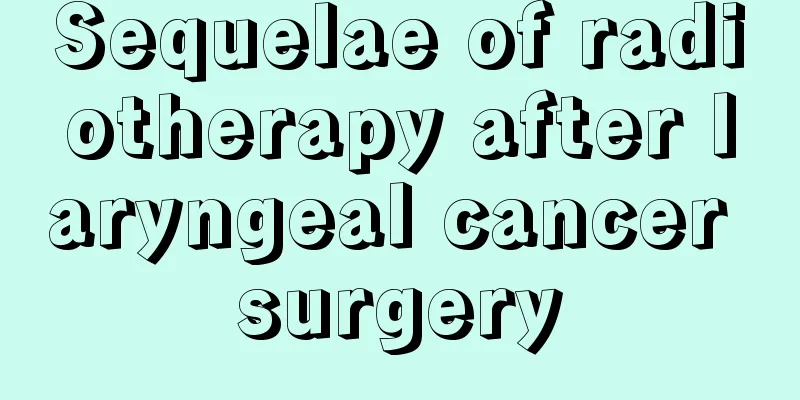Sequelae of radiotherapy after laryngeal cancer surgery

|
What are the sequelae of radiotherapy after laryngeal cancer surgery? After suffering from laryngeal cancer, patients will be very worried. Usually patients will choose surgery for treatment. So, what are the sequelae of radiotherapy after laryngeal cancer surgery? What should we pay attention to in daily life? What are the side effects of radiotherapy after laryngeal cancer surgery? Systemic reactions: including fatigue, dizziness, loss of appetite, nausea, vomiting, tastelessness or change in taste in the mouth, insomnia or drowsiness, etc. Some patients may experience changes in blood count, especially leukopenia. Although the degree varies, it can generally be overcome through symptomatic treatment and radiotherapy can be completed. If necessary, vitamin B1, B6, C, metoclopramide, etc. can be taken. If the white blood cell count drops below 3×109, radiotherapy should be suspended. Local reactions: including reactions of the skin, mucous membranes, and salivary glands. Skin reactions manifest as dry dermatitis or even wet dermatitis. Anti-inflammatory ointments with 0.1% borneol talc or lanolin as the base can be used topically. Mucosal reactions manifest as congestion, edema, exudation, and accumulation of secretions in the nasopharyngeal and oropharyngeal mucosa. Gargles and lubricating anti-inflammatory agents can be used topically. In a small number of patients, parotid swelling may occur after 2Gy of parotid irradiation, and the swelling gradually subsides in 2 to 3 days. When irradiated with 40GY, saliva secretion is significantly reduced, while oral mucosal secretion increases, and the mucosa becomes congested and swollen. Patients have dry mouth and difficulty eating dry food. Therefore, excessive irradiation of the parotid gland should be avoided. Sequelae of radiotherapy: mainly temporomandibular joint dysfunction, soft tissue atrophy and fibrosis, radiation-induced dental caries, radiation-induced osteomyelitis of the jaw bone, and radiation-induced encephalomyelopathy. What should we pay attention to in daily life? The diet of laryngeal cancer patients should be rich in nutrition and easy to digest, especially providing enough protein and vitamins. The food should be diversified and pay attention to color, aroma, taste and shape to enhance the patient's appetite. The diet should be light and avoid eating greasy food. Some appetizers can be added to stimulate the patient's appetite and eat small meals frequently. Radiotherapy is an important way to treat laryngeal cancer, but it has certain side effects. If it is within a certain range, the situation will be much better and the patient will recover slowly with treatment. |
<<: What are the complications after total laryngectomy for laryngeal cancer
>>: Is laryngeal cancer hereditary?
Recommend
What are the common methods for diagnosing gliomas
Some patients feel confused after being diagnosed...
The best way to remove a mole yourself
There are always some black moles on the surface ...
What are the symptoms and causes of viral myositis
Viral myositis is also called acute benign myosit...
How to wash red wine off clothes, 4 tips to resolve embarrassment
When having a meal together, it is inevitable to ...
Gallbladder wall edema
Anger and emotional instability are direct factor...
The advantages and disadvantages of enema coffee
Enema coffee can play a certain role in clearing ...
These 5 factors increase the risk of prostate cancer
Prostate cancer is one of the most common cancers...
Introduction to conservative treatment methods for perianal abscess
Conservative treatment is acceptable for perianal...
What Chinese medicine is good for pancreatic cancer
Patients with pancreatic cancer generally need to...
Anxiety Relief Medicine
Nowadays, the pace of social life is relatively f...
The air conditioner remote control is out of order
In the early stages of China's development, t...
The dangers of canned intestines
In today's daily life, there are a lot of del...
How to use a manual razor properly
The more common razors are manual razors and elec...
The reference range of normal values of the upper and lower limits of the liver is: 9-11cm.
The normal values of the upper and lower limits...
The functions and effects of aloe vera honey
Everyone is familiar with aloe vera. It is a fles...









